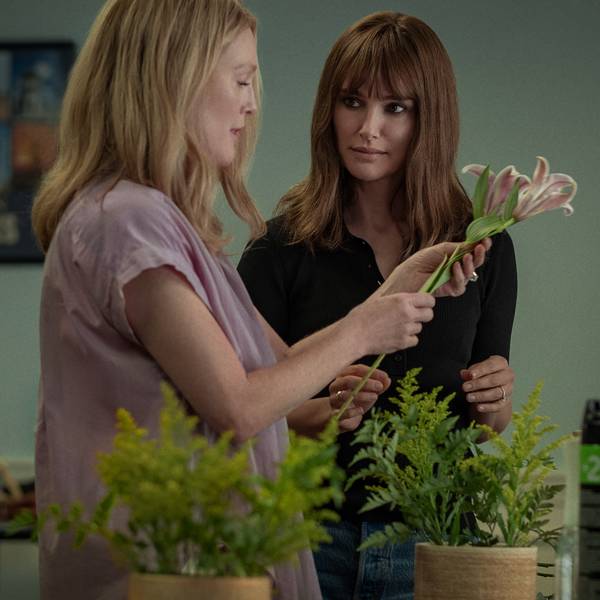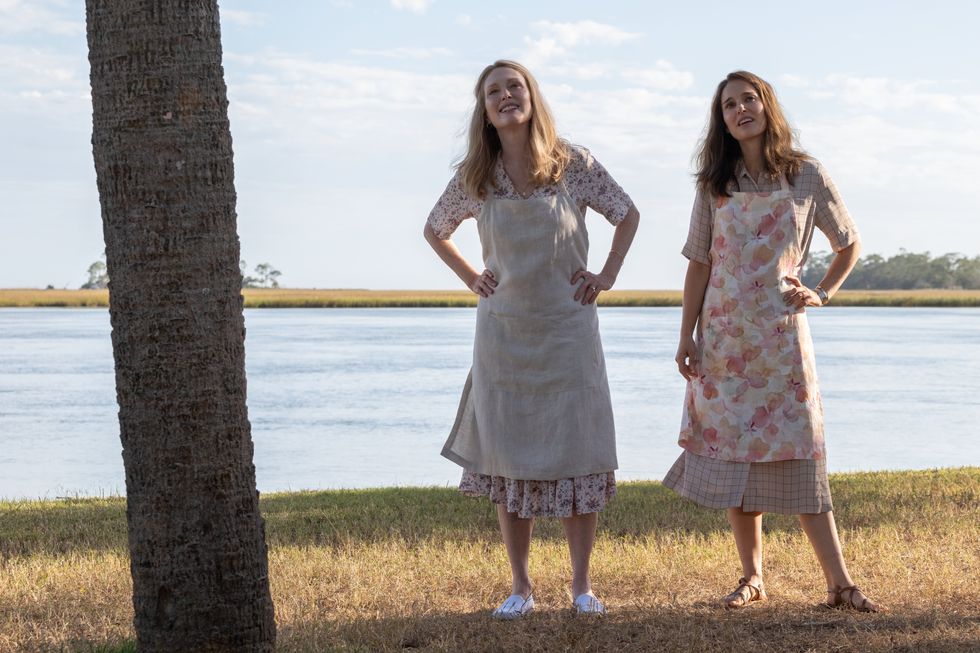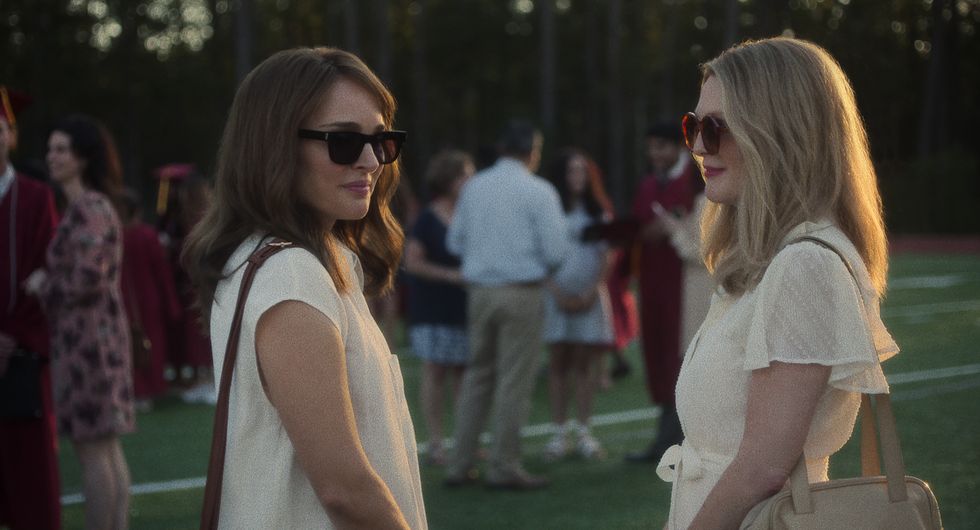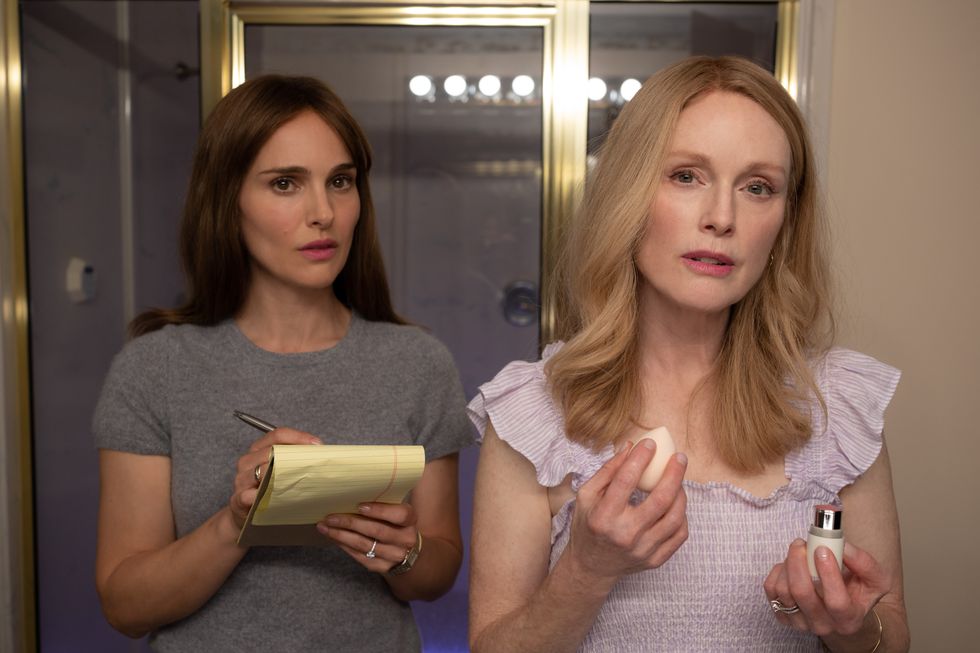
Julianne Moore and Natalie Portman Get Into Character
By Kyle Turner
Nov 21, 2023
For the majority of filmmaker Todd Haynes’ career, he’s been preoccupied with who we are, how we become and how those answers are inevitably tied to actresses. But it’s a two-pronged notion of actresses: both the cinematic firmament of Julianne Moore or Cate Blanchett (and their quasi-celluloid ancestors Deborah Kerr and Lauren Bacall), but also actresses in the way that women in our society must act under a certain male dominated social framework. Whether it’s the housewife who biomes allergic to her environment in [Safe], the housewife whose forbidden desires are cross-sectioned with her husband’s via deeply saturated color in Far From Heaven or the housewife who is caught between the independence she has about herself with the power her husband has over her in Carol, you could say Todd Haynes is a scholar of, ahem, Reel Housewives.
But these are all studies of how identification is a crucial part of how we all operate socially: the stories and narratives we consume, and their ability to perhaps invite us to understand the characters at their core, is part of a filmic game Haynes is playing. What are the techniques and tools that filmmakers use to both get us to identify with characters, but also indicate where these people exist in a social hierarchy? Melodrama has its operatic emotions, its florid sentimentality, its stinging social critique. Melodrama, too, floods our every day lives, with tabloid narratives frequently banking on the same emotional vocabulary.
So, it makes sense that Haynes would turn his eye to the most twisted questions of identification: what’s worse, identifying with an ambitious, vicarious actress or a woman who’s committed statutory rape? There’s wire-cutting tension built into the question, which may even seem offensive. But in May December, about an actress (Natalie Portman) who visits the home of a woman (Julianne Moore) who was in the tabloids in the 1990s for raping a 13-year-old (a now 35-year-old Charles Melton) to study them for an upcoming movie version of the events, Haynes and screenwriter Samy Burch have leapt in. Haynes, Burch, Moore and Portman saw complexity, age gap mine traps and a twisted persona swap black comedy and dove right in, making May December like bathing in paraffin wax: hot, painful, something that sticks to you.

In an age where every streaming platform has a documentary equivalent to a mea culpa for a woman thrown to the paparazzi wolves, May December smirks, lets its fangs hit the glint of the light and asks if these resurrection narratives are all just part of the same ecosystem of spectatorship and obsession, intense enough to shape our own identities and conceptions of who we are in relation to those other people who commit crime. It is due in no small part to the All About Eve-ish fork-tongued dialogue and matching of wits between Portman’s shrewd observer Elizabeth, eager to look beneath the surface of this marriage, and the direct, unburdened and self-assured thrall of Julianne Moore’s Gracie. As they spend more and more time together, their gestures start to merge, and mimicry becomes an uncanny fever dream. Portman looks into the mirror and says, as a signatory, “Your Gracie,” matching Moore’s lisp, but even more crucially, her guilelessness. They are certain of their own notions of what the truth is, and that they come into conflict with each other, and quake the audience’s sense of it, too; May December marks a flare gun to the head of a highlight to the careers of everyone involed.
PAPER caught a few moments with the stars of May December to talk about getting into character, acting to music and being born or made.
May December has a really rich universe. And I was wondering what your experiences were, Ms. Moore doing the photo shoots for the tabloid photos that we see in the film, and Ms. Portman, shooting the face wash commercial that’s in the movie. What is it like getting into character through these things that briefly tell us about the media landscape that these characters exist in?
Julianne Moore: It's interesting, this movie was inspired by a particular case [the Mary Kay Letourneau case], [though] it's not based on [that] case, but we very much used it as inspiration. And so when we were kind of looking at actual tabloid pictures, to recreate Gracie’s tabloid experience, it actually happened very fast. We didn't have a lot of time to shoot it, [so I was] kind of in and out of these costumes, sometimes only from the waist up, depending what you're shooting. But it was informative, just in terms of what his character's history was, what she had gone through, what's it like to have to walk through a press tour like that. What's it like to be behind bars for something that you've done that's illegal, you know, that you didn't think was illegal? I mean, it's all very complicated. But it was interesting, because it was stuff that we shot previous to working on the film, but it does deeply inform the work that you do.
Natalie Portman: And for the commercial, it was really funny. We laughed a lot making it because we're so familiar, we've seen those commercials so much. We obviously didn't want to be making fun of the character or making fun of the idea, but there is an absurdity to it that I think was ripe when we were filming it. I remember that the water was really cold. So like the first take, my reaction was like, splashing my face. [scrunches up face to react to ice cold water] And they were like, “Okay, we can't use that. Can you do it with more, you know, a pretty way of reacting? Not a horrific way of reacting to it.”
A "pretty" way of reacting to ice cold water.
Natalie: Exactly. That was the challenge.

I talked to Todd [Haynes] and he told me that the music from The Go-Between by Michel LeGrand was really embedded in the film very early in the process, that it was in the script and that he played it on the set. And I was wondering what it was like for both of you to have a piece of music that's so integral to a film's conception and how it has shaped your approach to performance onset.
Natalie: It was really important for me, I think it was the first time I've ever had that where the music that was in the movie was there on set. And it really created a tonal understanding of what we were doing and really, I think, brought us together because it was so specific. Only Todd could have come up with that. Like, I don't think anyone else would have chosen that music for this script. And it was just this strange atmosphere that was really helpful to understanding what we were making.
Julianne: And in a sense, I think you know, everything that you do production-wise, everything that surrounds you, once again, so informed what you're doing and sometimes it takes the pressure off of what of what you're creating in a scene, because it's about context. So it's like you're showing something that's kind of deliberately domestic and seemingly toothless. And then you put this kind of very, very emotional, this huge music next to it and you're communicating to the audience that something momentous is happening. And it was wonderful to have that as a tool or to have that kind of as a ballast in our performances.

When Natalie's doing the talkback, she discusses the question of whether someone was born or made. How would you answer that? Were you born or made?
Julianne: Both, right? I mean, that's the thing. As a parent, I remember my mother said that to us; she would say, “You're not any different than you were the day that you were born.” I feel that way about my kids, too. I realize there's so much about their temperament that I saw right away and that's that temperament. So I think that sometimes is inherent, but then obviously, [there’s] environment, everything you experience, how you are cultured, how you're educated, where you live, what language you speak, all of that that, you know, shapes you. And that's the fascinating thing about it. I think that's what Natalie is saying in her speech to the students too, right?
Natalie: I think so much of who we are is performance. But maybe the performance that we choose has to do with how we're born. And in the performances, I should say, because we're performing many different things for different people at different times.
Photos via Netflix Studios
From Your Site Articles
Related Articles Around the Web
MORE ON PAPER
ATF Story
Madison Beer, Her Way
Photography by Davis Bates / Story by Alaska Riley
Photography by Davis Bates / Story by Alaska Riley
16 January
Entertainment
Cynthia Erivo in Full Bloom
Photography by David LaChapelle / Story by Joan Summers / Styling by Jason Bolden / Makeup by Joanna Simkim / Nails by Shea Osei
Photography by David LaChapelle / Story by Joan Summers / Styling by Jason Bolden / Makeup by Joanna Simkim / Nails by Shea Osei
01 December
Entertainment
Rami Malek Is Certifiably Unserious
Story by Joan Summers / Photography by Adam Powell
Story by Joan Summers / Photography by Adam Powell
14 November
Music
Janelle Monáe, HalloQueen
Story by Ivan Guzman / Photography by Pol Kurucz/ Styling by Alexandra Mandelkorn/ Hair by Nikki Nelms/ Makeup by Sasha Glasser/ Nails by Juan Alvear/ Set design by Krystall Schott
Story by Ivan Guzman / Photography by Pol Kurucz/ Styling by Alexandra Mandelkorn/ Hair by Nikki Nelms/ Makeup by Sasha Glasser/ Nails by Juan Alvear/ Set design by Krystall Schott
27 October
Music
You Don’t Move Cardi B
Story by Erica Campbell / Photography by Jora Frantzis / Styling by Kollin Carter/ Hair by Tokyo Stylez/ Makeup by Erika LaPearl/ Nails by Coca Nguyen/ Set design by Allegra Peyton
Story by Erica Campbell / Photography by Jora Frantzis / Styling by Kollin Carter/ Hair by Tokyo Stylez/ Makeup by Erika LaPearl/ Nails by Coca Nguyen/ Set design by Allegra Peyton
14 October




